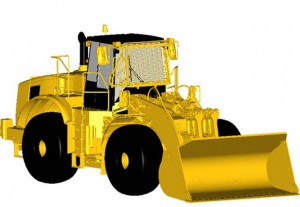As the United Auto Workers prepares to talk about future strategy, the UAW’s course may have already been staked out during the union’s recent negotiations with Caterpillar Tractor Co., in Peoria, Illinois.
While Detroit workers may be hoping to get back some of the big concessions they’ve made over recent years, the union agreed to a contract with Caterpillar including no raises for long-term or first-tier employees and a substantial boost in health care premiums.
Caterpillar workers ratified the new six-year contract, which doesn’t expire until 2017, at the beginning of March. The settlement sets out a bargaining pattern just as the UAW’s leadership prepares to turn its attention to talks with General Motors, Ford Motor Co. and Chrysler Group – negotiations set to begin over the summer.
The Caterpillar contract has served as the template for changes in the union’s contracts with Detroit’s automakers. Two-tier wages, the Voluntary Employee Benefit Association, or VEBA, as well as the wider use of temporary workers were all ideas first introduced during the union’s often contentious bargaining at Caterpillar.
In addition, all three automakers are certain to come under heavy pressure from Wall Street to match the terms won by Caterpillar in its new labor pact with the UAW – even though union leaders have been making noises suggesting they will push to gain back some of the concessions they’ve already given to Detroit’s Big Three..
There’s no question GM, Ford and Chrysler workers are already anxious about the upcoming talks.
“I haven’t had a raise in three years,” noted one Chrysler worker, noting the UAW is prohibited from striking for economic gains because of restrictions imposed as part of the federal auto bailout of Chrysler and General Motors, in 2009.
“Ford workers gave up four rounds of concessions,” said another UAW member this week. Meanwhile, top executives are collecting multi-million-dollar stock bonuses that are far more lucrative than the profit-sharing checks given to workers. Ford workers collected $5,000 in profit sharing from the company’s earnings in 2010.
At Caterpillar, this time around, union members received a cash bonus of $3,000 for ratifying the agreement, which is standard fare for UAW contracts with key employers.
However, for employees hired before Jan. 10, 2005, wages will remain fixed throughout the life of the agreement. Union members will receive a cost-of-living adjustment of $2.24 to $2.73 at the start of the contract, which was folded into the base wage of roughly $26,000. In addition, union members will get lump-sum payments of $1,000 in November, and another $1,000 in November 2012 — but no raise in base wages.
Union negotiators appear to have traded long-term wage increases for extra consideration for employees, nearing retirement. Employees will get a cash bonus and health care if they retire under the agreement.
Employees hired after Jan.10, 2005 on the second, or lower, tier, as well as employees assigned to logistics, and manufacturing supplemental workers, will receive “market-based” wage adjustments over the life of the contract and a 3% increase in 2013 if it is greater than the market adjustment.
Second-tier workers also will receive lump-sum payments of $2,000 in November and November 2012. But the market-based adjustments over the life of the agreement are capped.
Health-care premiums paid by Caterpillar employees are limited to 10% through the rest of 2011 but will increase to 15% over the next three years and to 20% in the last two years of the contract.
The agreement also included additional variable compensation that allows workers to get quarterly bonuses of up to $250 provided certain objectives are met by the business unit to which they are assigned.
Automakers also are expected to push for more variable compensation in the next contract.
Meanwhile, the UAW’s leadership indicated they were ready to move past the Caterpillar negotiations.
“The ratification is particularly pleasing as it may have finally put the troublesome relationship between the UAW and Cat right where it belongs: behind us,” said the union’s top negotiator, UAW Secretary-Treasurer Dennis Williams.
“This is another example of unions and business working together, recognizing each others’ needs, and finding creative solutions to keep good manufacturing jobs in the U.S. in this very competitive global economy,” said UAW President Bob King in a statement after the contract was ratified.


All of the hot air coming from Bob King’s office is threatening to accelerate global warming in the Southeast Michigan area! Gee, their stranglehold on the Big 3 pushed them into bankruptcy with unsustainable cost structures. Now they are profitable again because the government and a judge decided on a fair wage structure, in line with the rest of the industry, and now they want to head right back to the crippling wages that weakened the U.S. auto industry for the last 30 years. Funny how the suppliers aren’t trying to get back the concessions they had to make over the last 20 years while UAW wages and benefits kept improving. Well, any UAW member that thinks that Bob and his cronies have any chance at getting back the wages and bennies that they lost during the bankruptcy need to have their head examined. When are they going to get a reality check and stop buying into this baloney from the UAW fatcats? Their only real concern is keeping their cushy jobs. Hence the hot air followed by a lack of results. Did they propose scaling back the union dues as their member wages were brought back to reality? I think not. And now they are spending their member’s money on ill-advised membership drives at transplant factories with a clear track record of indifference to their siren songs. Wake up union members! I say dump your union and invest the $ you would have paid out in dues for your child’s education or your retirement. A vastly better use for your hard-earned money.